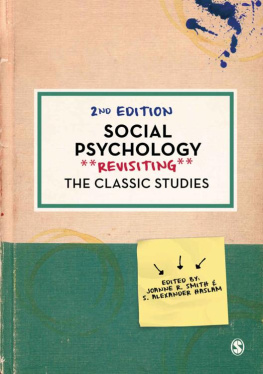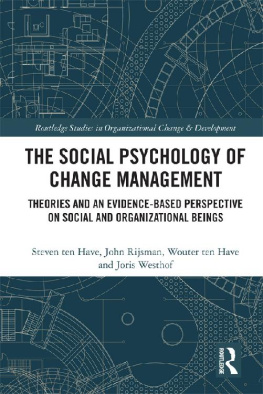Values, Self, and Society
Values, Self, and Society
Toward a Humanist Social Psychology
M. Brewster Smith
First Published 1991 by Transaction Publishers
Published 2017 by Routledge
2 Park Square, Milton Park, Abingdon, Oxon OX14 4RN
711 Third Avenue, New York, NY 10017, USA
Copyright 1991 by Taylor & Francis.
Routledge is an imprint of the Taylor & Francis Group, an in forma business
All rights reserved. No part of this book may be reprinted or reproduced or utilised in any form or by any electronic, mechanical, or other means, now known or hereafter invented, including photocopying and recording, or in any information storage or retrieval system, without permission in writing from the publishers.
Notice:
Product or corporate names may be trademarks or registered trademarks, and are used only for identification and explanation without intent to infringe.
Library of Congress Catalog Number: 90-40000
Library of Congress Catalog-in-Publication Data
Smith, M. Brewster (Mahlon Brewster), 1919
Values, self, and society : toward a humanist social psychology /
M. Brewster Smith.
p. cm.
Includes bibliographical references and index.
ISBN 0-88738-373-4
1. Social psychology. 2. Humanistic psychology 3. Personality
and culture. 4. Social values. I. Title.
HM251.S662 1990
302dc20
90-40000
CIP
ISBN 13: 978-0-88738-373-1 (hbk)
To my grandchildrenGarrett, Melanie, Bryan, Jesse, and Masumiand to the future of everyones children and grandchildren in the twenty-first century
The chapters originally appeared in the following books or journals. In each case, permission to reprint my copyrighted material is gratefully acknowledged.
: Psychology and values, Journal of Social Issues 34 (4) (1978): 181-99. Copyright 1978 by the Society for the Psychological Study of Social Issues.
: Perspectives on selfhood, American Psychologist 33 (1978): 1053-63. Copyright 1978 by the American Psychological Association. Reprinted by permission.
: Attitudes, values and selfhood, in H. E. Howe and M. M. Page, eds., Nebraska Symposium on Motivation 1979. Lincoln: University of Nebraska Press, 1980. Copyright 1980 by the University of Nebraska Press.
: The metaphorical basis of selfhood, in A. J. Marsella, G. De Vos, and F. L. K. Hsu, eds., Culture and self: Asian and Western perspectives. New York and London: Tavistock Publications, 1985. Copyright 1985 by Anthony J. Marsella, G. De Vos, and Francis L. K. Hsu. A passage is drawn with permission from The cognitive model of anger inherent in American English, by G. Lakoff and Z. Kvecses, in D. Holland and N. Quinn, eds., Cultural models in language and thought. New York: Cambridge University Press, 1987. Copyright 1987 by Cambridge University Press.
: Toward a secular humanistic psychology, Journal of Humanistic Psychology 26 (1) (1986): 7-26. Copyright 1986 by Association for Humanistic Psychology. Represented by permission of Sage Publications.
: Metapsychology, politics, and human needs, in R. Fitzgerald, (ed., Human needs and politics: Essays in philosophical anthropology, political philosophy and social psychology. Rushcutters Bay, N.S.W., Australia: Pergamon Press (Australia), 1977. Copyright 1977 by Perga-mon Press PLC.
: Encounter groups and humanistic psychology, in K. W. Back, ed., in Search for community: Encounter groups and social change. Washington, D.C. and Boulder, Colo.: American Association for the Advancement of Science and Westview Press, 1978. Copyright 1978 by the American Association for the Advancement of Science.
: Psychology and the decline of positivism, in R. Jessor, ed., Perspectives on behavioral science: The Colorado lectures. Boulder, Colo.: Westview Press, 1990. Copyright 1990 by Westview Press.
: Beyond Aristotle and Galileo: Toward a contextualized psychology of persons, Theoretical and Philosophical Psychology 8 (2) (1988): 2-15. Copyright 1988 by Division 24, Theoretical and Philosophical Psychology, American Psychological Association.
: Psychology and the public interest: What have we done? What can we do? American Psychologist 45 (1990): 530-36. Copyright 1990 by the American Psychological Association. Reprinted by permission.
: McCarthyism: A personal account, Journal of Social Issues 42 (4) (1986): 71-80. Copyright 1986 by the Society for the Psychological Study of Social Issues.
: War, peace, and psychology, Journal of Social Issues 42 (4) (1986): 23-38. Copyright 1986 by the Society for the Psychological Study of Social Issues.
: Value dilemmas and public health: A psychologists perspective, International Quarterly of Community Health Education 7 (2) (1986-1987): 79-90. Copyright 1987 by the International Quarterly of Community Health Education.
: Hope and despair: Keys to the sociopsychodynamics of youth, American Journal of Orthopsychiatry 53 (3) (1983): 388-99. Copyright 1983 by the American Orthopsychiatric Association, Inc.
I still think of myself as a social psychologist (psychological rather than sociological variety), but the conception of social psychology with which I feel at home no longer fits the way the present field defines itself. Todays journals, textbooks, and conferences represent a vigorous but rather narrow scientific specialty in psychology, the practitioners of which are more exclusively in communication with each other, more closely focused on agendas that are primarily and often only intelligible within the subdis-cipline, than was the case when I formed my identity as a psychologist. When I was an undergraduate in the 1930s, my kind of social psychology was being launched by creative generalists like Gordon Allport (1937), Gardner and Lois Murphy (1931), Theodore Newcomb (1943), Otto Kline-berg (1940), Kurt Lewin (1936), and Muzafer Sherif (1936), who mostly had strong interdisciplinary ties and who mostly also contributed to the emergence of personality as a differentiated academic field. (The phrase personality and social psychology was typically used to label a single entity.) These founders were characteristically involved in the human problems of the social and political world, on which they sought to bring the emerging concepts and methods of social psychology to bear.
Over more than four decades, my own efforts have involved me in the mainstream of psychology, in which I have paddled up the current more often than not. As I wrote at midpassage in an autobiographical item,
With increasing clarity, I have struggled to make sense of an emerging three-way commitment: to a psychology that seeks to come to grips with human experience (and in that sense is humanistic), to a psychology that broadly abides by the rules of the game of science as a public, self-critical, and therefore cumulative social enterprise aimed at the comprehensive understanding of the phenomena in its territory, and to one that bears helpfully on the urgent social problems that hinge on an ingredient of human cussedness. That has made me a generalistat a time when ever more intensive specialization has been the predominant trend. The things I have done that have pleased me most, in writing and teaching and consultation, have been efforts at conceptual mapping and clarification, of establishing relevance and cutting across established boundaries, more than the direct products of my research. To an extent greater than I sometimes like to admit, I have been an armchair psychologist. If there is an Establishment in psychology and the social sciences, I am nevertheless surely a member of it butI hopeI am something of a maverick. (1972, p. 214)











